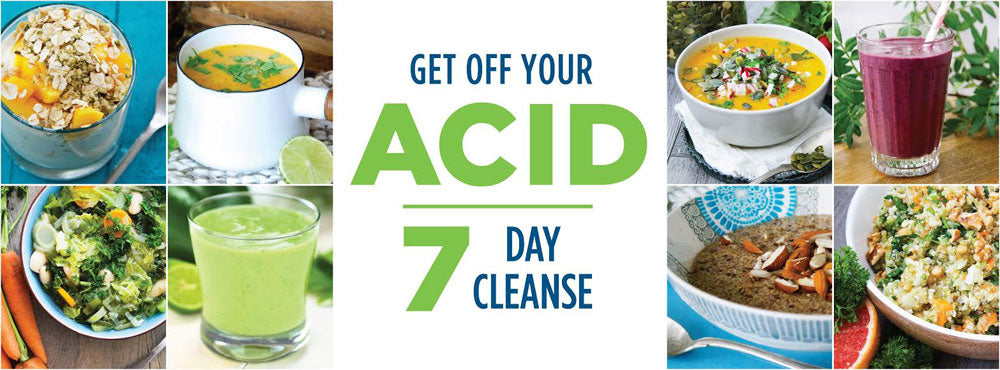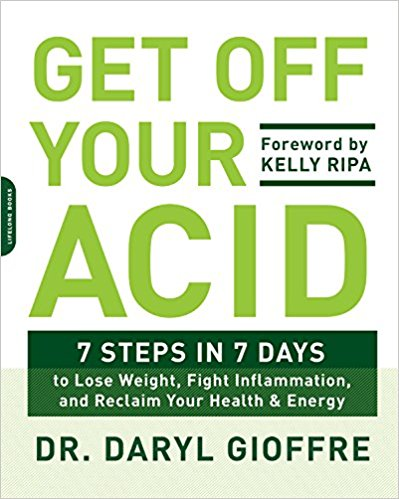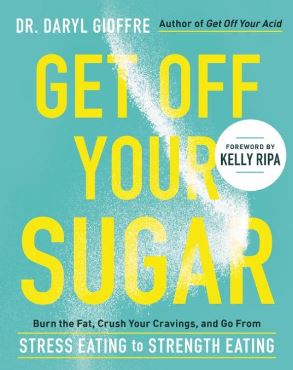 Back when I was playing soccer every day at Boston College, I thought I knew how to eat to perform on the field.
Back when I was playing soccer every day at Boston College, I thought I knew how to eat to perform on the field.
Whoa, was I wrong!
I would carbo-load before matches, eating pasta with heavy sauces.
I would try to bulk up, eating meat three times a day.
And maybe worst of all, I would reward my hard work with sugary candy after every practice and game.
No wonder I felt terrible all the time and was getting injuries left and right!
I was expecting my body to be a world-class athlete with hardly any healthy fuel to run on.
Despite what some may say, you can’t exercise your way out of a bad diet. I learned that lesson the hard way.
Fortunately, I’ve learned so much since those days and I’ve changed the way I eat before, during, and after working out since then.
The results – I am more fit in my 40s than I ever was when I was playing soccer every day and I honestly can say nutrition plays a HUGE role in that!
Now, I give my body what it needs, and it rewards me with unstoppable energy and good health all the time.
Without having to think about it, I avoid the sabotages that plague people trying to get healthier like:
-
not being able to lose unwanted weight, despite working out and trying to eat well
-
crashing after exercise and feeling depleted the rest of the day
-
throwing off your body’s sensitive blood sugar balance, leading to headaches and sugar cravings
-
preventing muscle tissue from healing properly after a workout or an injury
-
a metabolism that is working slower than it should be working
I know you don’t want to suffer from any of that, and instead, you want to learn how to burn FAT instead of sugar. So let’s run through what I eat and how you can take action to do the same.
BEFORE A WORKOUT
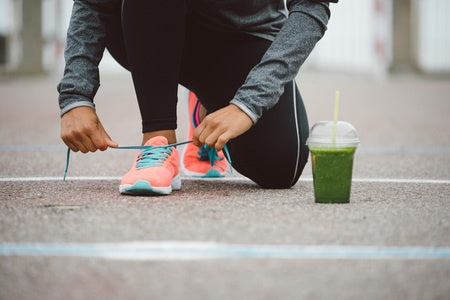
And as far as fuel goes and what to eat, it is very straight forward as well. Avoid SUGAR at all costs.
I keep myself very well hydrated before, during, and after a workout.
Your body will lose an extra liter of water working out. SO you must replace this. The average person loses 2.5 liters of water daily, so if you are exercising, that loss becomes 3.5 liters.
So your goal should be to drink 3-4 liters of water not just on that day, but the days leading into your workouts.
Same goes for nutrition.
Believe it or not, what you eat right before your workout is not as important as what you eat the night before or even 2 days before.
What you eat 2 days before a workout will have a massive impact on your performance that day, so we need you to be proactive, not reactive in regards to what you are putting into your body on an ongoing, regular basis.
 Before a workout, I want something that is easy to digest. I will drink Daily Greens for energy (about 30 minutes before) and there is nothing easier on the digestive system. I know that’s going to deliver vitamins and minerals to my body right away that will give me a healthy energetic kick-start I need to get moving.
Before a workout, I want something that is easy to digest. I will drink Daily Greens for energy (about 30 minutes before) and there is nothing easier on the digestive system. I know that’s going to deliver vitamins and minerals to my body right away that will give me a healthy energetic kick-start I need to get moving.
If I am going to eat something, it will be something light like a vegetable soup, or pureed vegetables. I will have some nut butter.
The lower intensity the workout, the more fat I eat.
Remember, if you eat fat, you will burn fat, and then your body will crave fat, and that is the cycle you want. If you eat sugar, you’ll be more likely to burn sugar, then you will crave sugar, and that is what you need to avoid.
That is why the very worst thing you can ever do is carb load before working out, or the night before a big race. It’s amazing in all the marathons I participate in, the night before they are all having these big pasta parties.
Avoid a lot of protein before a workout as well, as this can cause cramping, since protein requires more fluid to be metabolized than carbs and fat do, and cramping occurs when the body is less hydrated.
And the same goes for protein as it did sugar – we do not want this as our primary source of fuel. Protein is for building muscles, not for fueling them.
And what are the most common foods I see available on the marathon course? Bananas, oranges, candy, and Gatorade.
ALL BAD, WHY?
Because it’s sugar. SO when exercising, again, ALWAYS avoid sugar.
DURING MY WORKOUT
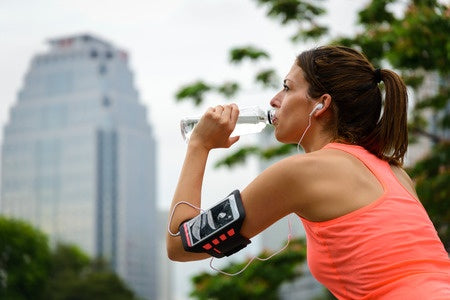
Now you might be thinking, “Dr. D eats during a workout?” Good question.
I don’t eat. I drink. And I have a feeling you already know what I drink…
 WATER!
WATER!
Lots of it!
I try to drink a liter of water while I’m working out. That might sound like a lot, but that’s what your body is losing as you sweat.
So replenishing as you go is essential to prevent you from becoming like a dried up sponge during the course of your workout.
Because what happens to a dried up sponge when you run water over it?
Most of the water slides off, not getting absorbed at first.
I like to add a few slices of lemon or lime to my water bottle before I hit the gym because it tastes delicious and it has extra alkalizing effects.
When I am exercising, I always have a single-serve packet of Daily Minerals with me at the gym, in my pocket to add to water, or to drink immediately after my workout to neutralize the lactic acid.
If I am exercising for more than 90 minutes, I’ll have a small snack that is more fat oriented.
For example, I will take a sprouted tortilla, I will spread it with raw almond butter, I will drizzle a little Manuka honey, some chia seeds, and then some cinnamon to prevent an insulin spike from the Manuka, and cut it into tiny slices.
I will make my own energy gel with 1 cup water and 2 to 4 tbsp. of chia seeds – this is a great healthy fat full workout energizer if needed, and I will have a spoonful of that.
But most importantly, no matter the exercise, stay well hydrated. Every 15 minutes, I take a big sip of water; I squish it around my mouth, and then swallow.
AFTER MY WORKOUT

After a workout, alkalizing foods are an integral part of the body’s post repair process.
If you don’t alkalize, the lactic acid will build up in your body and your joints, and will cause joint pain, inflammation, stiffness, and muscle aches.
You quickly want to get something into your body to get it into your cells, and the window to do this is about 15 minutes.
 The first thing I do after a workout, before I’ve even left the gym, is take a pack of AlkaMind Daily Minerals (I keep them in my gym bag for convenience) and add it to 16 ounces of water.
The first thing I do after a workout, before I’ve even left the gym, is take a pack of AlkaMind Daily Minerals (I keep them in my gym bag for convenience) and add it to 16 ounces of water.
That way, I start refilling the tank right away with the nutrients that have depleted – potassium, magnesium, calcium, and sodium bicarbonate.
Then when it’s time for my next meal (I wait at least half an hour), I will prepare a plant-based protein smoothie, where I will have some greens like spinach or kale or watercress or Swiss chard, a frozen banana or some berries, and some healthy omega 3 fats like chia, flax, and a scoop of a plant-based protein smoothie powder (Excited to announce we will be launching our very own plant-based protein in May, so be on the lookout!)
 The plant-based omega 3 fatty acids are very helpful in the repair of the body tissue.
The plant-based omega 3 fatty acids are very helpful in the repair of the body tissue.
You can also add a tbsp. of UDOs oil which is an amazing plant based omega 3-6-9 blend.
I also like sunflower seeds (I always sprout them for a few hours), nut butters like raw almond butter, and yes, even your dark green leafy veggies like spinach and kale are packed with protein.
45 minutes after your workout or more, you can then have some solid proteins, whether that’s a salad with some salmon and/or avocado, chia and sprouts.
I avoid any and all grains and sugar (even from fruit) for several hours after a run or the gym.
The reason why, other than already drinking a smoothie with fruit in it earlier in the day, is that the exercise combined with sugar (even fructose) will throw off the body’s blood sugar balance and send a signal that the body has entered starvation mode, holding on to all of the sugar, carbs, and fat that it can.
How to take action: Bring a BPA-free water bottle with you to the gym or wherever you exercise. Drink as much as you can while you’re working out so your body isn’t dehydrated as you go.
Take action: Bring AlkaMind Daily Minerals so that you can replenish those necessary post-workout minerals right away. Eat your next meal around an hour after working out if you can, and choose a good, plant-based protein to eat with veggies and keep clear of any sugar or refined carbohydrates.
Get out there and get moving! Don’t forget your AlkaMind Daily Greens and AlkaMind Daily Minerals. And if you want more tips on making it easy to Get Off Your Acid, follow us on Facebook and Instagram.
 Skip to content
Skip to content



